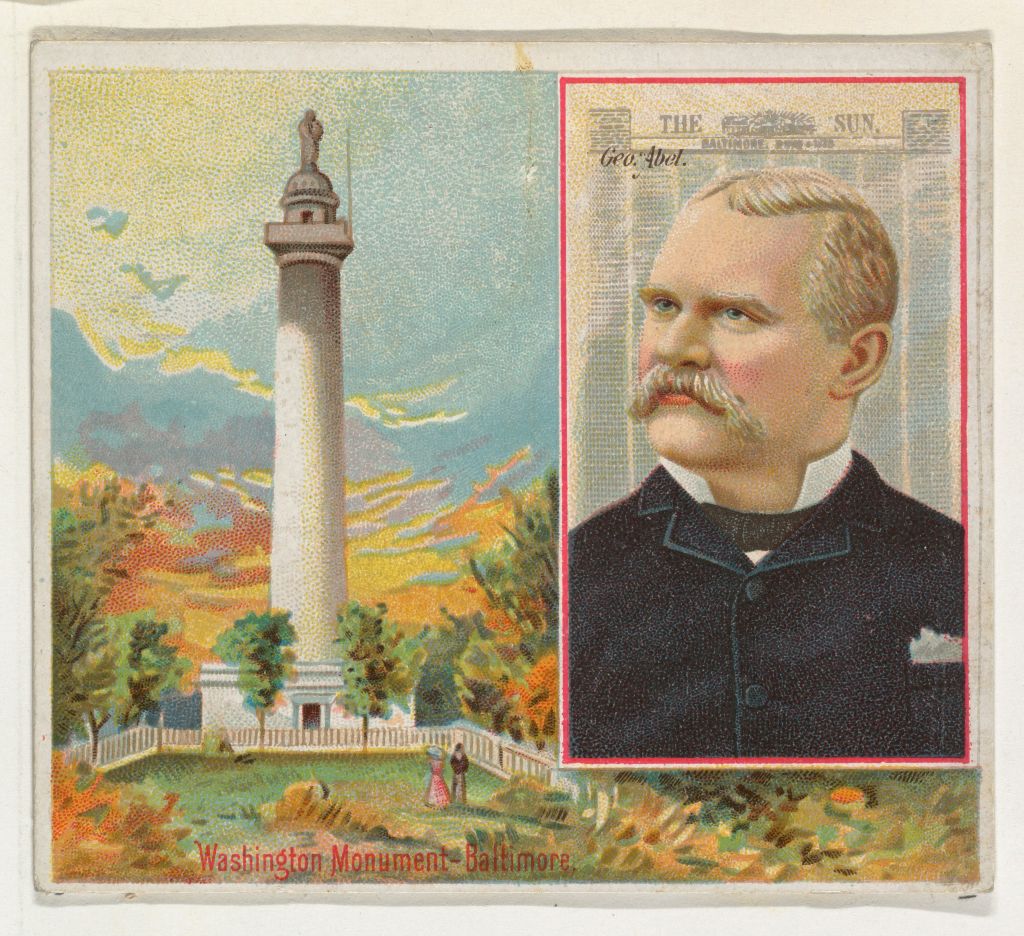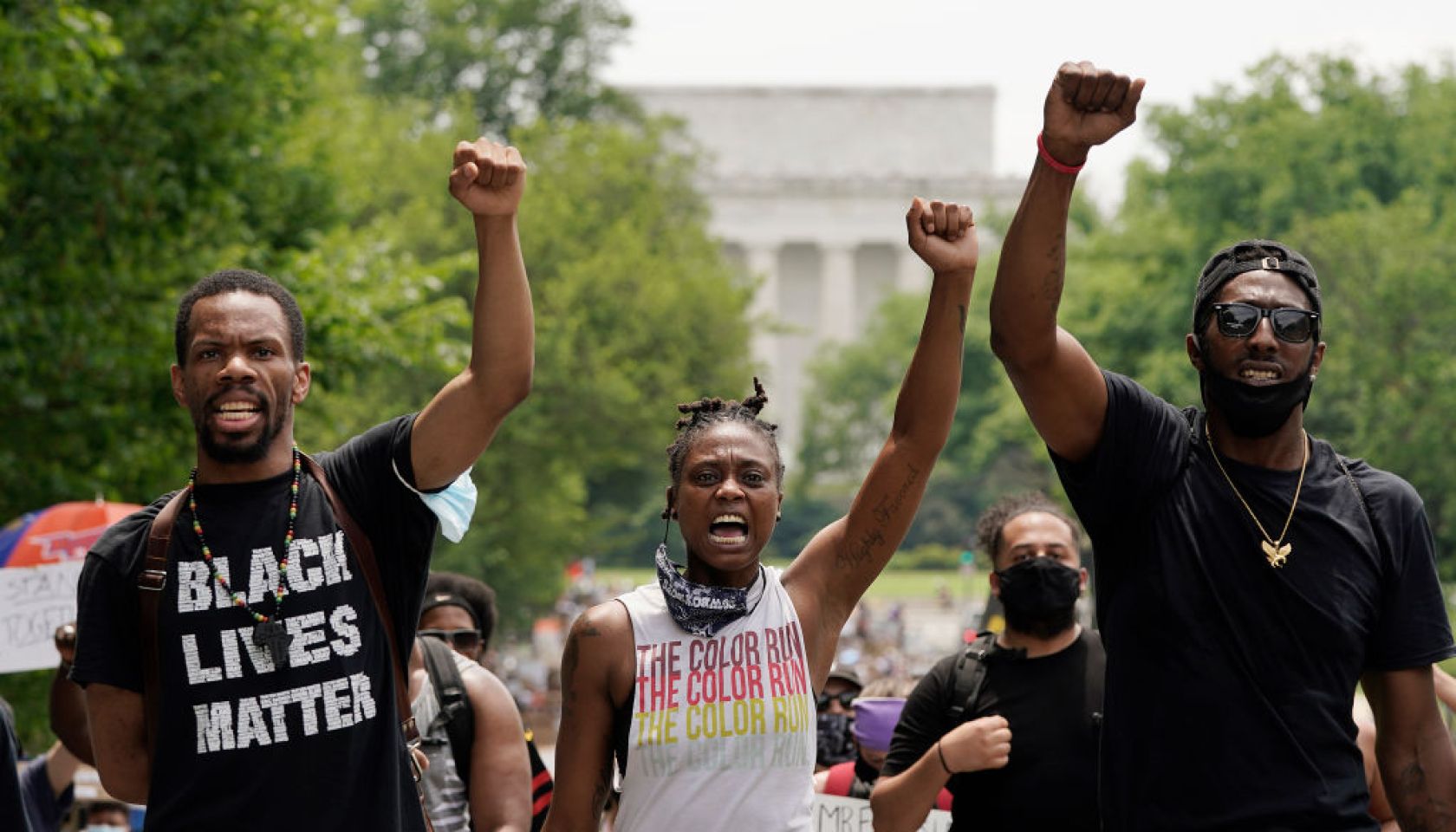OP-ED: White America Should Stop Apologizing For Its Racism

George Abel, The Baltimore Sun, from the American Editors series (N35) for Allen & Ginter Cigarettes, 1887. Artist Allen & Ginter. (Photo by Heritage Art/Heritage Images via Getty Images) Source: Sepia Times / Getty
In its February 18 issue, The Baltimore Sun’s editorial board finally apologized for 185 years of racist coverage.
The authors wrote that the newspaper had “sharpened, preserved and furthered the structural racism that still subjugates Black Marylanders in our communities today.” For its culpability, “We are deeply and profoundly sorry.”
The Sun’s half-performative apology contributes to the normalization of whiteness in U.S. culture, even while the magazine profits from the cultural capital it gains for (partially) apologizing for racism.
Full disclosure: I got my start as a journalist for The Sun in 1997 when I was 19 years old writing for the Metro Section. I enjoyed working in that newsroom and had a great rapport with reporters and editors. The editors even allowed me to step beyond my reporter role to write pieces for the Op-Ed section. In fact, my first opinion piece carried the following headline: “Apologize for slavery? Yes – with deeds.” Over the years as a journalism professor, I’ve proudly watched a few of my HBCU students work on collaborative projects and as interns for the paper.
But I still shrugged after reading that lengthy editorial and moved on with yet another day of living in racist capitalist America with all its hypocrisy and psychopathological trickery. Quite frankly, I’m so over this wave of self-congratulatory apologies and chronic virtue-signaling that attempts to mask ongoing white supremacist aggression. As a student of history, I’ve learned that racism is a family heirloom that is consecrated in blood and affirmed through serial acts of violence. We have daily evidence to support that white America’s commitment to racial discrimination and Black death remains secure.
These purification rituals, whether they come from politicians, food brands, universities, or newspapers, might provide some white folks with an emotional bypass that makes them feel good, and they may symbolically vindicate Black people’s long-held truths about their lived experiences. But don’t get it twisted – these expressions of profound sorrow do not complete the work of reparatory justice. They won’t inaugurate a new era of race relations. And they do nothing to transform white America from a nation of criminals into rehabilitated members of a human community.
If you’ve seen one apology for racism, you’ve pretty much seen them all because they tend to follow a similar pattern.
Since the 1990s, neoliberal white Americans have been belatedly and weakly apologizing for all kinds of racial horrors committed against Black people – slavery, segregation, stealing land and not giving it back, internment camps, crude medical experiments, failing to pass federal anti-lynching legislation, and so on. Apologizing to Black people for the wrongs they and their ancestors suffered under for more than 300 years of chattel slavery and another century of Jim Crow laws has been a popular trend since the Clinton era.
Back in 1995, Rep. Tony P. Hall (D-Ohio) proposed a one-sentence resolution suggesting that Congress apologize for slavery as a simple and moral starting point to heal the nation’s racial wounds. Most whites reflexively recoiled at the idea. Some argued that they had never owned slaves and denied that they were beneficiaries of systemic racism. Others believed that since Black people are no longer living on plantations and they now have the right to vote, equality has been achieved. We’ve done enough for you people!
Meanwhile, Black folks argued that an apology was meaningless without a well-funded effort to repair the damage. But Rep. Hall was clear that his idea was never to link a national apology to reparations, nor was it seen as a magical solution to the nation’s racial strife.
“It’s a step toward healing. That’s all it is, a simple apology. Someday it will happen. I just don’t see it happening anytime soon,” Rep. Hall told the Washington Post in August 1992.
Years later under the Bush administration, debates over a national apology continued. “We would all reap enormous national and international benefits for such a good will gesture,” retired Vanderbilt University political science and law professor Carol M. Swain wrote. “And it would do immeasurable good in terms of improving race relations. Best of all, it wouldn’t cost a cent. That’s a pretty good deal all around.”
“Wouldn’t cost a cent”! There it is – just say the words and this should be some major concession that the harmed should be in deep gratitude for.
In 2009 when an apology was finally issued, Swain, who is a self-hating bigoted Black conservative and Trump supporter, called it meaningless. She now spends her time on Twitter and Fox railing against critical race theory and the “deceptive left.”
Back in 2005, the U.S. apologized for its repeated failure to pass anti-lynching legislation which could have prevented the deaths of thousands of Black lives. But now the Emmett Till Antilynching Act, which would make lynching a federal hate crime, has been stalled in the Senate for almost two years. Will they eventually need to apologize for that too?
In the aftermath of the May 2020 killing of George Floyd, white America underwent a collective “reckoning” and displays of anti-racism, from politicians kneeling in Kente cloth, white folks playing dead at protests, the removal of statutes of racist heroes, renaming schools, and companies committing to more diversity hires. There were also uprisings in newsrooms over the lack of newsroom diversity and about how stories are framed and reported. A number of large newspapers and television networks pledged to hire and promote more Black reporters. But efforts to track diversity in journalism continue to lag and storytelling about Black people and Black issues continues to be framed for white people while outlets continue to profit from the cultural capital it gains for partially apologizing for racism.
While several media outlets called The Baltimore Sun’s expression of regret “stunning,” it is just the latest influential news outlet to apologize to Black folks. The Kansas City Star and Los Angeles Times have apologized for past racist coverage. A few years before our current racial reckoning, the Hartford Courant, Montgomery Advertiser, Orlando Sentinel, Meridian Star, and National Geographic issued apologies for their contributions to slavery, lynching, and discrimination.
In Waco, Texas, the Tribune-Herald apologized for its coverage of the 1916 lynching of 17-year-old Jesse Washington, which include photos of his naked body being tortured by thousands of white people. But I find that kind of apology to be deeply disrespectful to the victim, to his parents and other relatives. Imagine that the only photo that exists of your loved one is his lynching. That apology does not heal the fact that this boy was castrated, his teeth were plucked from his mouth by white boys and sold for $5 a piece, and that other parts of his body were collected and stored in jars of formaldehyde. That apology does nothing to heal the generational trauma that still exists in that Black community.
What especially grates my soul is that the Poynter Institute, a nonprofit research organization that helps to increase diversity in media, published an advice piece back in October 2019 that coaches news outlets on how to craft believable apologies. The headline reads: “Does your news organization owe African Americans an apology? Here’s how to do it the right way.” Here are the tips from the piece:
Whoever issues the apology matters
An apology from the editor-in-chief or the editorial board is more powerful than one written by individual reporters because they have power to speak for the institution. Having leadership involved suggests institutional change going forward.
Be proactive
Publications should not wait until a public relations crisis to issue an apology; otherwise the motivation may seem insincere, which weakens the apology overall.
Set the record straight and be transparent
Several publications have enlisted outside researchers to help analyze their coverage before issuing apologies. Doing so suggests some level of neutral observation, but involving members of the newsroom in the process suggests buy-in from the paper’s staff. Ideally, such a process would involve both. Regardless of who’s doing the research, it should be clear what time period is under investigation and how materials were reviewed.
Accept blame and identify harm, both individual and collective. Consider the difference between the following:
“I’m sorry your foot got stepped on.” (Does not accept blame or identify harm)
“I’m sorry I stepped on your foot.” (Accepts blame, but does not identify harm.)
“I’m sorry I stepped on your foot and broke several of your toes that required multiple surgeries. That caused you not only pain but financial and emotional distress for your entire family, as you could not drive for several months and lost your job.” (Accepts blame and identifies harm).
When you read the handful of apologies from news organizations, you can clearly see how they follow the above template, which for me makes them even more performative and scripted and less authentic. Under pressure, these news outlets have awakened to the fact that their physical environment needs to be diverse, and there needs to be internal change in behaviors, policies, and practices. But what about material compensation to Black communities? There’s rarely, if ever, and talk about reparations.
Some folks might read these apologies and say, “Well, it’s a good start.” But why did it take these organizations so long to apologize, especially when there were always voices, Black and white, who called out injustices and racist coverage while they were happening? There have long been Black journalists and scholars who investigated and documented media bias. Why didn’t these news outlets apologize then?
Why should we applaud apologies for serial acts of barbarism? Thank you for apologizing to me for enslaving and raping my ancestors. Thank you for apologizing for breaking up our families, for stealing our land, burning our schools, lynching our relatives, and making our lives a living hell at every turn? What does it say about white America’s humanity that it has to apologize so much for its inability to act like basic human beings? Why do they need breathless tutorials to teach them how to apologize the right way?
Some folks might say that apologies are better than nothing. They might say it doesn’t hurt for people or institutions to own their mistakes or re-examine past and present biases. But these apologies keep coming in the context of ongoing white supremacy: attacks on Critical Race Theory, erasing and whitewashing history, banning books, aggressive legislation and attacks on teachers, assaults on voting rights, and state-sanctioned killings of Black people.
How do you expect Black America to believe what you say, when we see what you do?
If you are a Black person who shrugs or side-eyes these apologies, it is a sign that you are healthy and will not be manipulated into positive reinforcement of our oppressor’s repeated cycles of abuse and devaluation. Offering absolution will only grant permission for more pathological degradation.
Dr. Stacey Patton is an award-winning journalist and author of “Spare The Kids: Why Whupping Children Won’t Save Black America” and the forthcoming “Strung Up: The Lynching of Black Children In Jim Crow America.”
SEE ALSO:
















